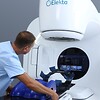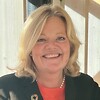Fritextsökning
Artiklar per år
Innehållstyper
-

“An entire industry is about to be wiped out”
According to Jennie Ekbeck, CEO of Umeå Biotech Incubators, Sweden risks not having any small diagnostic companies left in five years.
-

Column: ”Life as a F1 race”
"The F1 car makes several pit stops during a race and during a lifetime the human being may also have to come in several times for maintenance", Björn Ursing writes in a column.
-

A surprising discovery about the immune system in cases of cancer
Professor Göran Jönsson is trying to understand why some patients benefit from immunotherapies while others don’t. A couple of years ago, he made a surprising discovery about the function of the immune system.
-

Column: ”Authentic leadership and clear mandates pave the way for more female CEOs”
”I believe that the aspect of having clear mandates and titles on the one hand and women progressing into top positions must be explored further”, Helena Strigård writes in a column.
-

Claims of life science companies fleeing abroad is a myth according to survey
The claim that life science companies are moving abroad is exaggerated. In fact, only a tiny percentage is leaving the country, according to a survey.
-

Rekrytering slutförd till Alzecures smärtstudie
Den sista patienten har nu rekryterats till Alzecures pågående kliniska studie som utvärderar bolagets ledande läkemedelskandidat ACD440 mot nervsmärta.
-

"Unclear proposal from the EU Commission on how to solve the MDR challenges"
Even before the EU regulation on medical devices (MDR) came into force, medical technology companies and doctors were concerned that it would endanger the availability of medical devices in the EU. Unfortunately, the fears have come true.
-

Irlab rasar på börsen efter besvikelse i Parkinsonstudie
Det Göteborgsbaserade forskningsbolaget Irlab Therapeutics konstaterar att en fas IIB-studie med mesdopetam för Parkinsonpatienter inte lyckades nå det primära målet. Bolagets aktie backade med över 60 procent när börsen öppnade på onsdagen.
-

Sweden is organising a large life science conference as part of the EU presidency
On 26-27 June, Sweden will host a European meeting on life science.
-

“Everyone is screaming for talent”
Attracting talent is one of the life science industry’s major future challenges, which was one of the conclusions of the panel discussion that ended the New Horizons in Biologics & Bioprocessing conference on 15 December.
-

Cancerbolaget Anocca får EU-lån på 25 miljoner euro
Södertäljebaserade Anocca har säkrat ett lån på 25 miljoner euro från Europeiska investeringsbanken (EIB) för fortsatt utveckling av sina skräddarsydda cancerbehandlingar. Dessutom uppges företaget planera en finansieringsrunda modell större.
-

ALS – When the body has given up, but the brain persists
The nerve disease ALS gradually deprives the patient of control over the muscles and, eventually, also of speech. The eyes continue to function, though, and with the help of, among other things, a Swedish-developed invention, communication with the outside world can continue. “It’s their window to the world,” says ALS researcher Caroline Ingre.
-

She creates pharmaceuticals on a 3D printer
The correct dosage for each individual, regardless of whether the pharmaceutical is for a seriously ill child or a frail elderly person, is the mission of a well-advanced project with 3D-printed drugs at Uppsala University. “It will soon be available in clinics”, says Christel Bergström, who is heading the project.
-

ALS – När kroppen har gett upp men hjärnan finns kvar
Nervsjukdomen ALS berövar patienten gradvis kontrollen över musklerna, och till sist även talet. Men ögonen fortsätter att fungera, och med hjälp av bland annat en svenskutvecklad uppfinning kan kommunikationen med omvärlden fortsätta. "Det är deras fönster mot världen", säger ALS-forskaren Caroline Ingre.
-

Neanderthal genes and Nobel Prize in a popular lecture at Bioscience
An inherited gene variant from our ”evolutionary cousins” – the extinct Neanderthals – may affect how our bodies break down certain drugs. “It’s only a matter of time before we actively start screening for it,” said KI researcher Hugo Zeberg when describing the study at Bioscience 2022.
-

Cannabisklinik får verksamhetsförbud
Aureum Healthcare i Stockholm får verksamhetsförbud med omedelbar verkan meddelar Inspektionen för vård och omsorg, enligt Läkartidningen.
-

Elekta ska träna strålningspersonal i Indien
Strålbehandlingsbolaget Elekta startar ett utbildningscenter i Mumbai i samarbete med indiska Healthcare Global Enterprises. Meningen är att låta medicinsk personal lära sig använda de senaste framstegen inom strålbehandling och höja nivån på cancervården i Indien.
-

Cytel Inc acquires the SDS Group
The multinational statistical software developer and contract research organization Cytel Inc, headquartered in Massachusetts, USA, acquires the Swedish consulting company SDS Life Science.
-

Brown Dog Affair: Djurförsöket som skakade Storbritannien
En intet ont anande terrier, två svenska djurrättsaktivister, en känd fysiolog, brittiska medicinstudenter och en staty som behövde polisskydd. Det är några av ingredienserna i "Brown Dog affair" – en konflikt om djurförsök som splittrade England i början av 1900-talet.
-

“We aim to be a start-up company with an academic spirit”
Chronic pain and Alzheimer’s are two diseases that plague many people worldwide and seem impossible to cure. However, Huddinge-based company Alzecure is working on developing drugs for both conditions.
-

SDS-koncernen köps av amerikanskt bolag
Cytel Inc, med huvudkontor i Massachusetts, USA, förvärvar det svenska konsultbolaget SDS Life Science.
-

“We need to keep investing in research and innovation”
Jenni Nordborg has worked for just over four years to highlight life science in Sweden. Her mandate as national coordinator ends in December 2022. ““Life sciences has been a long-term priority of governments since many years and I have no doubt that the ambitions will be strong going forward”, says Jenni Nordborg.
-

Biosimilars bring price pressure, but are they sufficiently used?
When biosimilars were introduced just over 16 years ago, hopes were raised that they would give many more patients access to effective but otherwise extremely expensive treatments with biological drugs. So, how well has Swedish healthcare used biosimilars? The answer partly depends on whom you ask.
-
Business Sweden’s new team is rolling out the blue-yellow carpet
According to Business Sweden’s life science team, the combination of substantial medical know-how and an ever-flourishing tech sector is a success factor for Sweden. “It’s a perfect storm, a beneficent, perfect storm,” says Programme Manager Britta Stenson.